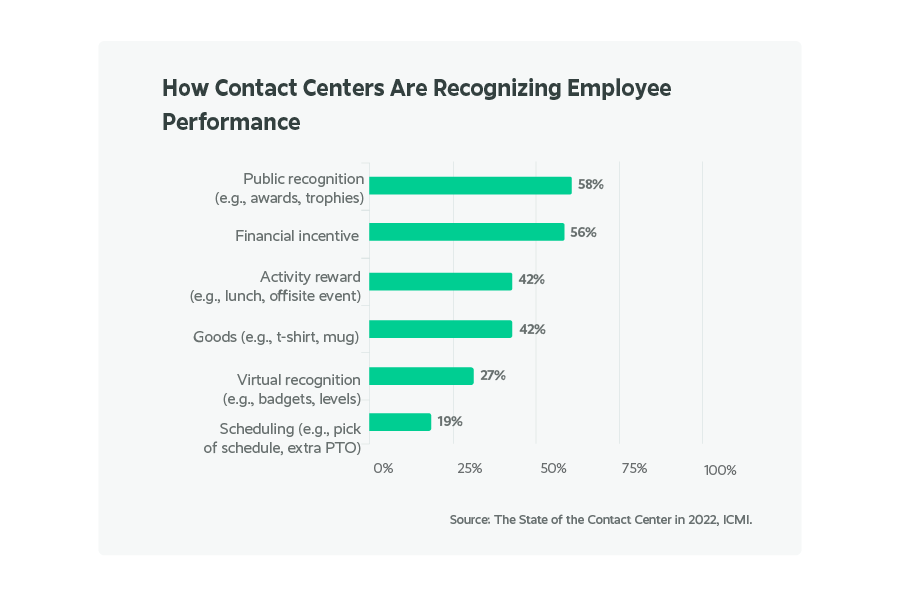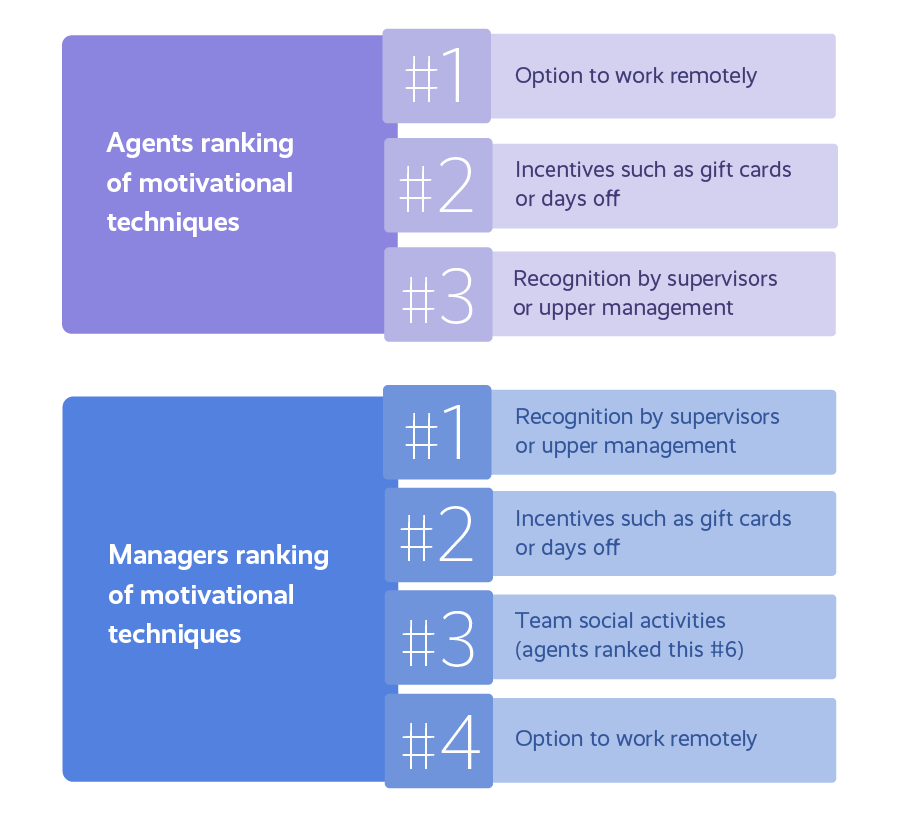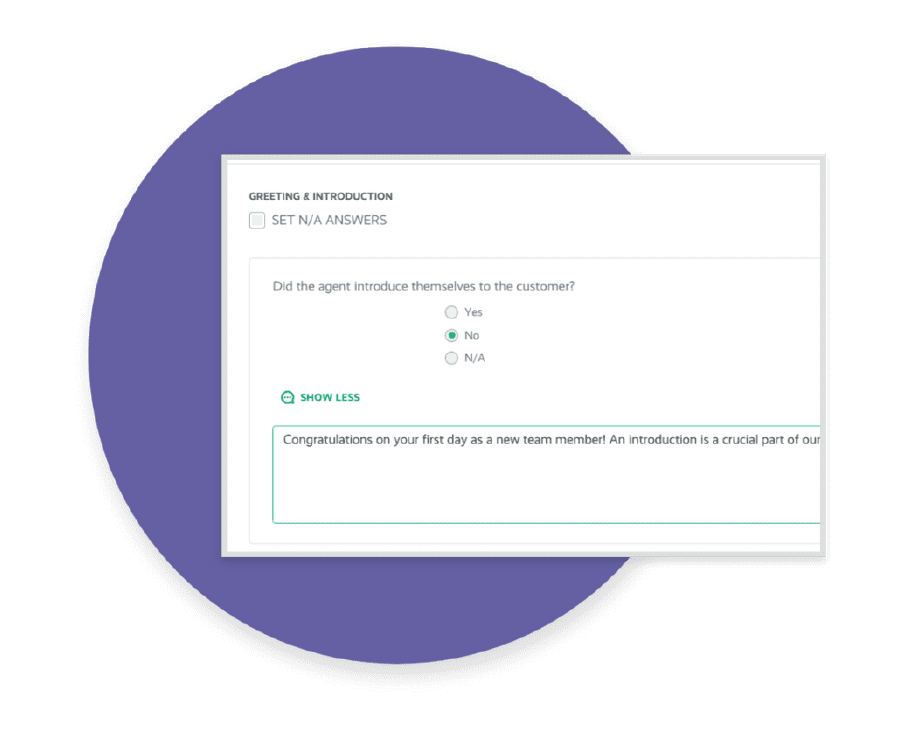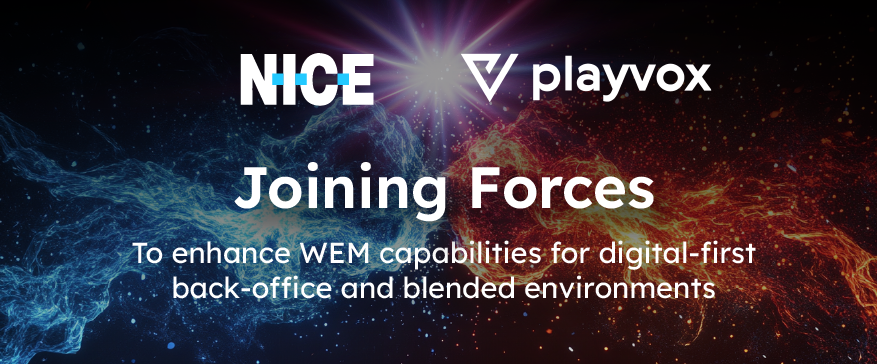The Power of Recognition: How to Motivate Agents Authentically
Think about the last time you reached out to a contact center for one of the services or products that you purchased. You could have contacted the company in a multitude of ways — chat, text, social media, or even an “old-fashioned” telephone call. No matter how you may have reached out, one thing is likely to be true — you weren’t calling to tell the company how pleased you were with the product. Instead, you were contacting the company because you were unhappy and displeased with whatever it is that you purchased.
When you’re working in a contact center, this is your reality — taking contact after contact, call after call, from people who either need support or are angry about their experience with your company’s product or solution. Learning how to motivate agents in this kind of environment can seem difficult, if not impossible.
Agent motivation in a call center is crucial for driving employee engagement, enhancing customer satisfaction, and increasing overall performance. Motivated agents are more likely to be committed to their work, leading to improved productivity, higher quality interactions with customers, and ultimately greater satisfaction for both employees and customers. This, in turn, leads to higher customer retention and increased profitability for the business.
In contrast, low agent motivation is linked to high attrition rates in contact centers, resulting in increased recruitment and training costs, along with a negative impact on overall team morale. Even more importantly, continual agent attrition forces less experienced agents to be on the front line with your most valuable asset — your customers. When agents are motivated by a sense of purpose, they are more likely to remain committed to their role, resulting in reduced turnover and a more consistent, high-quality customer experience.
The importance of agent motivation in a call center cannot be overstated. Employees who are not engaged or who are actively disengaged cost the world $8.8 trillion in lost productivity, according to Gallup’s State of the Global Workplace: 2023 Report. That’s equal to 9% of global GDP. But how can you motivate employees in what is a role often fraught with problems, issues, and frustrated customers?

Understanding Agent Motivation
As you think about how you can motivate agents, you must first understand the relationship between an agent’s actions and their motivation. By delving into what drives an individual to act in a certain way, we can gain insights into their behavior and make more informed decisions. Let’s explore the different factors that influence agent motivation, including intrinsic and extrinsic motivations, SMART goals, and career path planning. By gaining a deeper understanding of what motivates agents, we can better understand their actions and work towards creating more positive and productive environments that ultimately drive better customer experiences.
Intrinsic vs. Extrinsic Motivators
Intrinsic motivators come from within the individual, such as personal satisfaction, a sense of achievement, and the enjoyment of the work itself. On the other hand, extrinsic motivators come from external factors, such as bonuses, promotions, or other tangible rewards.
When exploring how to motivate agents, it’s important to note that intrinsic motivators have a more significant impact on employee engagement and performance than extrinsic motivators. When employees are motivated intrinsically, they are more likely to be passionate about their work and go above and beyond to meet their goals. They are also more likely to stay with the company for the long term.
In a call center or support center, examples of intrinsic motivators include recognition for a job well done, opportunities for personal and professional growth through a defined learning path, and a meaningful and challenging work environment. Extrinsic motivators, on the other hand, may include performance-based bonuses, promotions, or other monetary rewards.
While financial rewards are important, overall, intrinsic motivators are more effective in nurturing a motivated and high-performing team in a call center environment, as they lead to greater job satisfaction and sustained employee engagement. McKinsey data show that when employees are intrinsically motivated, they are 32 percent more committed to (and 46 percent more satisfied with) their jobs, suffer significantly less burnout than other employees do, and perform 16 percent better. All of this translates to employees who are a lot more likely to want to stick around with their employer. It is not too great of a leap to believe these more experienced agents are likely to deliver far better customer experiences than their less experienced or less motivated peers.
The Role of Job Satisfaction in Motivation
Job satisfaction is a crucial factor in motivating anyone, but especially those who are having difficult interactions day-to-day such as call center agents. Employers can enhance job satisfaction by focusing on positive motivation and utilizing engagement tactics such as recognition and rewards. Many of Playvox’s customers leverage tools like gamification to motivate their teams. Positive reinforcement with tools like these can boost morale and lead to a more satisfied and motivated call center organization. While gamification may be one option for recognition, there are many ways to build morale and celebrate success. The following chart shows how contact centers like yours are recognizing service agents and can help answer the question of how to motivate agents in your specific service center.

Creating a Positive Work Environment
It seems obvious, but a positive work environment is essential for employee satisfaction and motivation. When individuals feel supported, valued, and respected in their workplace, they are more likely to be engaged and motivated. This is even more important given how inherently stressful it can be for call center employees who are on the front lines of customer dissatisfaction or problems. Creating a positive work environment involves fostering open communication, providing opportunities for growth and development, and promoting work-life balance.
Establishing a Company Culture that Values Employees
To establish a company culture that truly values employees, there are several key factors to consider. You can prioritize employee well-being by providing mental and physical well-being perks such as wellness programs and access to mental health resources. You can also consider providing agents with reduced cost or highly subsidized membership to a gym or workout facility near their home or your office.
Promoting open communication, collaboration, and a supportive atmosphere also helps motivate agents. This doesn’t mean giving out empty praise or insincere feedback. Instead, share insights on performance through a comprehensive quality management program where you help your agents see how they can improve their customer interactions. According to a recent Gallup study, best-in-class managers use ongoing conversations to deliver feedback that celebrates successes and calibrates performance. Personalize recognition efforts by acknowledging individual achievements and contributions. Show genuine appreciation for your employees’ hard work and dedication, whether it’s through verbal praise, postings via an online employee portal, company-wide recognition events, or personalized incentives. Again, tools such as those that let you gamify, are another way to reward outstanding performance. Additionally, the importance of enabling flexibility in where an agent works – whether that be from home, an office, or a mix of the two can help make support center agents feel valued and increase agent engagement and satisfaction.
While many support centers may feel like all agents need to work a traditional schedule, offering flexible hours and schedules can be an added perk that enables agents to find a balance between work and personal life, reducing stress and increasing job satisfaction. Agents in our 2022 study said the opportunity to work remotely was the most motivating reward they could receive, followed by incentives like days off or gift cards. This stands in contrast to contact center managers we surveyed, who thought recognition from superiors was the top motivator for agents.

Agents do want recognition from leaders, but those we surveyed preferred more personal rewards and had a strong desire to work remotely with some flexibility. If you’re wondering how you might be able to build schedules with this type of flexibility, numerous Workforce Management solutions can help you automate wildly varying schedule needs to accommodate the needs of your contact center.
Setting Attainable Goals for Agents to Help Drive Motivation
With SMART goals — which are specific, measurable, achievable, relevant, and time-bound, agents can visualize a direct path to success, which can significantly increase their motivation. These goals also enable agents to develop their own motivators, as they can see their progress and have a clear understanding of what they need to achieve. SMART goals can positively impact the entire call center by keeping everyone on the same page, defining what counts as success. This ensures that your team is aligned with the same objectives and working towards a common goal.
Regular performance evaluations, feedback, and celebrating goal achievements are all crucial in maintaining motivation. Evaluations via a defined quality management system, provide an opportunity to assess progress and make necessary adjustments, while feedback offers guidance for improvement, helping improve agent motivation. The screenshot below shows the type of feedback available through Playvox’s Quality Management solution:

While support centers normally have set KPIs such as the time it takes for first contact resolution (FCR), you can still involve agents in the goal-setting process. Start by conducting 1-on-1 meetings to understand their professional goals and motivations. During these meetings, offer resources to support their career development, such as training opportunities, mentorship, or professional development programs. Encourage agents to share their aspirations and any challenges they may be facing in reaching their goals.
Next, work with each agent to set SMART goals, while also clearly aligning with the company’s objectives. Regularly evaluate performance, provide constructive feedback, and celebrate achievements to keep agents motivated and on track.
Once goals are set, make sure you continuously support agents in their professional development by revisiting their goals in 1-on-1 meetings, providing ongoing resources, and identifying any necessary adjustments. By involving agents in this process and focusing on their professional goals, you can create a more motivated and engaged team.
Offering Continuous Training and Skill Enhancement Programs
Implementing continuous training and skill enhancement programs for call center employees is not only important for their professional development and career advancement, but can also drive agent motivation. These programs can include regular training sessions, coaching, and mentorship opportunities to help employees improve their skills and competencies. Some contact center employees may be at the beginning of their careers, and will need to visualize a clear plan for career advancement, including opportunities for promotion and growth within the organization.
Ultimately, investing in continuous training and skill enhancement programs is not only beneficial for employees, but also for the overall success of the call center. By prioritizing professional development, employees can continue to improve their skills and contribute to the success of the organization.
Providing Clear Career Progression Paths
Another way to motivate agents is to provide a clear career progression path. As you think about how you can do this, reflect on the skills new agents are acquiring from day one. Entry-level positions typically involve customer service and basic support tasks, with opportunities to develop communication and problem-solving skills. Once employees have gained experience, they can advance to mid-level roles, which involve taking on more complex customer issues and possibly specializing in a particular area, such as technical support or sales.
To move into managerial and supervisor positions, employees need to demonstrate strong leadership skills, the ability to coach and mentor team members, and a thorough understanding of call center operations. Usually, those who are excelling in their current role are your best “bench” for leadership – although keep in mind the skills that make a person a solid support agent, may not immediately translate to the skills needed to be a manager. Make sure to put a mentoring and/or coaching system into place to help that employee as they move up in the organization.
Motivate Agents, Attain Better Customer Experiences
As noted throughout this article, when you have a plan in place to motivate and engage agents, you’ll see that it translates into better customer experiences. Those who are satisfied with their work are more likely to provide better customer service. You cannot do one, with the other.
Want to learn more? Download Celebrating Success In The Contact Center: Top Tips For Engaging And Motivating Agents







